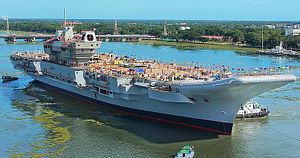India’s first domestically built aircraft carrier, the future INS Vikrant, designated IAC-1, is slated to commence basin trials sometime in February or March next year, according to a senior Indian naval official.
“IAC-1 is presently moving at a very, very brisk pace and the plans are to go in for basin trials sometime in February-March next year,” Indian Navy Vice Admiral A. K. Saxena, the controller of Warship Production and Acquisition, was quoted as saying by The Economic Times on July 9.
Basin trials precede sea trials and test a ship in floating condition in calm waters.
“That will be followed with a series of Contract of Sea trials and ultimately culminate in to delivery of the ship sometime in early 2021. Towards this, a hectic activity is going on board the ship,” the vice admiral added.
The carrier is lead ship of the Indian Navy’s Vikrant-class, the first carrier class to be designed and built in India under Indigenous Aircraft Carrier (IAC) program, which in turn is part of the Indian Ministry of Defense’s (MoD) Maritime Capability Perspective Plan.
Construction of the carrier began in 2009. The new flattop was officially launched in August 2013 and relaunched in June 2015.
The head of the Indian Navy, Admiral Sunil Lanba, announced in December 2018 that sea trials of the new carrier were slated to commence in 2020. Originally, the carrier was scheduled to be delivery to the Navy in 2014 and commissioned in 2016. The commissioning was then pushed back to 2018 with sea trials to take place in 2017.
There are multiple reasons for the delay, as I explained previously:
Construction of the carrier was delayed multiple times over the last few years primarily due to hold-ups in procurement including contractual disputes with Russia’s Rosoboronexport over the construction of the carrier’s aviation complex.
The program has also been plagued by cost overruns with the carrier, as of now, costing as much as $4 billion more than originally budgeted. Indian Prime Minister Narendra Modi allocated an extra $3 billion to the IAC program in 2014 to speed up construction of the Vikrant.
The 40,000-ton Vikrant operates a ski-jump assisted Short Take-Off But Arrested Recovery (STOBAR) launch systems for launching aircraft. Asked about the start of flight trials aboard the carrier, Saxena said: “Flight trials are to start after the delivery. There will be some activity prior to the delivery, which is aviation facility complex and making the ships ready for flight trials thereafter.”
The new carrier will be able to accommodate up to 40 aircraft.
































